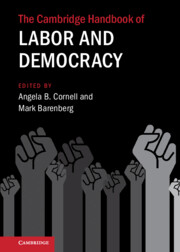Book contents
- The Cambridge Handbook of Labor and Democracy
- The Cambridge Handbook of Labor and Democracy
- Copyright page
- Contents
- Contributors
- Acknowledgments
- Introduction
- Part I Labor and Democracy: Theory and Practice
- Part II History, Politics, and Law
- Part III Labor, Diversity, and Democracy
- Part IV Country and Regional Perspectives
- 14 Labor, Workers’ Rights, and Democracy in Latin America
- 15 African Perspectives on Labor Rights as Enhancers of Democratic Governance
- 16 Why (Which) Workers Often Oppose (Which) Democracy?
- 17 Reclaiming Democracy
- 18 A Critical Assessment of Democratic Labor Unionism in South Korea from a Feminist Standpoint
- Part V Labor and Democracy Sectoral Case Studies: Platform Workers, Higher Education, and the Care Industry
- Index
- References
14 - Labor, Workers’ Rights, and Democracy in Latin America
from Part IV - Country and Regional Perspectives
Published online by Cambridge University Press: 25 January 2022
- The Cambridge Handbook of Labor and Democracy
- The Cambridge Handbook of Labor and Democracy
- Copyright page
- Contents
- Contributors
- Acknowledgments
- Introduction
- Part I Labor and Democracy: Theory and Practice
- Part II History, Politics, and Law
- Part III Labor, Diversity, and Democracy
- Part IV Country and Regional Perspectives
- 14 Labor, Workers’ Rights, and Democracy in Latin America
- 15 African Perspectives on Labor Rights as Enhancers of Democratic Governance
- 16 Why (Which) Workers Often Oppose (Which) Democracy?
- 17 Reclaiming Democracy
- 18 A Critical Assessment of Democratic Labor Unionism in South Korea from a Feminist Standpoint
- Part V Labor and Democracy Sectoral Case Studies: Platform Workers, Higher Education, and the Care Industry
- Index
- References
Summary
This chapter traces Latin America’s labor movement’s long, tumultuous struggle for workers’ rights, equity, and democracy through periods of corporatism, authoritarian rule, neoliberalism, and contemporary left- and right-wing populist governments. This chapter argues that, while segments of Latin America’s labor movements have, at times, collaborated with autocratic elites, a significant share of labor leaders and members have fought for democratization not out of perceived partisan advantage, but rather out of commitment to the principles of liberal democracy – and labor has often realized that commitment by strengthening democracy. This chapter examines theoretical debates on labor and democracy and labor’s role in the struggle for democratization and equity during crucial periods in regime formation and transition in Latin America.
- Type
- Chapter
- Information
- The Cambridge Handbook of Labor and Democracy , pp. 237 - 249Publisher: Cambridge University PressPrint publication year: 2022
References
- 1
- Cited by

